The problem is not that we don’t have a codified British constitution it’s that too few know about it. Allowing Parliament to hide it, assume authority they don’t have, and deceive the British people.
This deception is exemplified on the UK Parliaments own website which states:
“Parliamentary sovereignty is a principle of the UK constitution….. Parliament [is] the supreme legal authority in the UK, which can create or end any law…….. The courts cannot overrule its legislation…… Parliamentary sovereignty is the most important part of the UK constitution……. the UK constitution is often described as ‘partly written and wholly uncodified’. (Uncodified means that the UK does not have a single, written constitution.)”
This accurately describes the establishment’s version of the British Constitution. Such a constitution is perfect for any corrupt multinational corporation, bank, wealthy globalist or foreign power.
They can use their practically limitless resources to lobby, bribe, blackmail or simply employ Members Of Parliament (MP’s) to deliver whatever laws or regulations they want. There’s no need to corrupt 65 million people when you only need to manipulate 650 useful idiots.

This leads to precisely the form of ‘government’ we suffer in the UK today. Detached from the electorate, riven with corruption and exclusively serving the interests of the rich and the powerful. While we unquestionably accept the fabricated constitution, it won’t change.
Thankfully, nothing in Parliament’s statement is true. The more constitutionally aware MP’s (and there aren’t many) know this. The ruling establishment has always known it, and that’s why they have been deceiving the British people for nearly a millennia.
In Part 2 we discuss what the codified British Constitution really is, how it came into being and how it has been usurped. Politicians, and the institutions of state, are very keen to spin the yarn that we don’t have a codified, written constitution. But we do.
You might struggle to accept this fact. This is entirely understandable because the British education system, academia and the legal system have all been commandeered to hide the British Constitution.
For argument’s sake, just for now, let’s assume Britain does have one. What does that Constitution say and what would be the implications if it were fully implemented?
Every statist society is governed through its laws. Britain is no exception. So the question is, who creates society’s laws? We are told law is formed in two fundamental ways. The Common Law (law that continuously evolves through precedents established by judicial rulings which are ‘substantive’ or ‘procedural’) and Statute Law (law created by Acts of Parliament – often amended by Secondary Legislation or other Statutory Instruments.)
Consequently, most people believe that ‘Law’ comes from Judges and Parliament. This appears to be the case under Parliament’s malign interpretation of their own claimed power. However, the hidden British Constitution states that it is the people who determine the laws of the land. Judges and Parliament are both subordinate to the ‘Rule of Law’ and consequently to the decisions, will or “custom,” of the people.
For a society to have any hope of functionioning justly there must be equity. That is to say everyone is equal under the law, no matter who they are or how much money or power they have. The genuine British Constitution makes it clear that this is the case. No one is above the law. Including Judges and Parliament.
Of course, we always hear Politicians say “no one is above the law” but we only have to look at how justice is applied in Britain to know this is an absurd nonsense. The current ‘legal system’ is hopelessly crooked. Enough money buys you whatever ‘justice’ you want. If you have none, you’re screwed. Does anyone seriously question this?
We are taught, from an early age, that the UK government functions as follows.
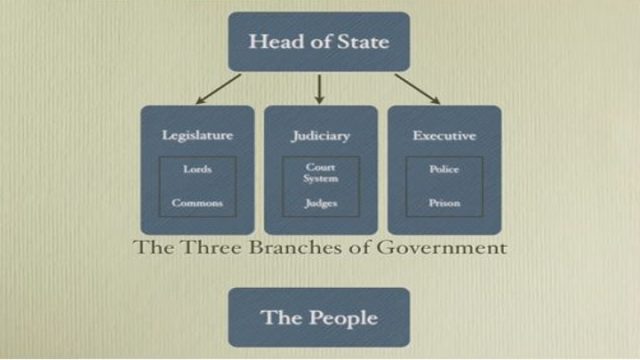
At the top we have the Crown (Head of State) which, since the Glorious revolution of 1688, is a constitutional monarchy, limited by law. A constitutional monarchy has existed since at least 1215. However, this was progressively eroded and ignored over the centuries leading to the revolution which reestablished the principle.
Then we have Parliament and the three branches of government. The Legislature (the House of Commons and Lords,) The Judiciary and the Executive (the Head of State, the ‘elected’ government of the day and their officers.)
Right at the bottom of the pile we have the people. Therefore, if we believe this suggested model, the people broadly have to do what they are told by government. This is because Parliament claims it is sovereign and has all authority. Don’t forget, Parliament themselves say that they are “the supreme legal authority in the UK, which can create or end any law.”
However, this is not the model of governance established by the genuine British Constitution. Under the true Constitution the situation is very different. Parliamentarians are nowhere near as powerful under the real Rule of Law. Perhaps explains why we have been ‘educated’ to believe that a single, codified, written British Constitution doesn’t exist?
Which brings us to our much-vaunted democracy. We are frequently reminded that ‘democracy’ means we can choose our leaders (elected ‘government’ and Parliament) once every 5 years (in the UK.) This is not what the word democracy means. That all adults can vote is called ‘universal suffrage,’ not ‘democracy.’ Nor does democracy mean being ‘represented by a legislature.’ That’s just consensus politics, which frequently leads to all manner of mob rule atrocities.
The etymology of ‘democracy,’ from the ancient Greek ‘Demos’ (the people) and ‘Kratos’ (sovereignty,) shows the word means ‘sovereign people.’ True Democracy is based upon the Hellenic Athenian Constitution of ancient Greece, which established ‘government by Trial by Jury.’ Democracy is a system of rule where individual ‘citizen jurors’ are the final arbiters of the law. As we are about to discover, the true definition of democracy is extremely important.
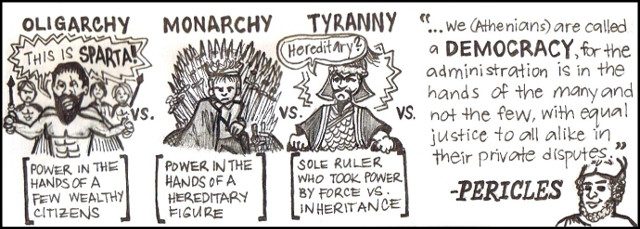
We are encouraged to be thankful that we live in a ‘democracy,’ even though it isn’t one. Since 1928, all adults, with a few exceptions, have been allowed to elect their leaders. Aren’t we lucky?
Nationally, we exercise our so-called democratic power once every 1825 days (ish.) We are ruled absolutely for the intervening 1824 days and have virtually no influence on decision making at all.
Most people will exercise their ‘democracy’ on less than 20 days in their entire lives. They are all told that voting is a vital civic duty for which many have sacrificed their lives. Unfortunately, under the current constitutional arrangement favoured by Parliament, all voting delivers is power to people who will immediately renege on their manifesto commitments and then completely ignore the people for the next 5 years.
However, the buried British Constitution determines otherwise. It says we exercise our true democratic rights virtually every single day of our adult lives. So what does this codified British Constitution define? How is society and democracy intended to function if the true Constitution is observed?
Above all else there is Natural Law. This informs the Rule of Law which is interpreted by and evolves through, day in, day out, the will (and custom) of the people. The people then allow a ‘government’ to be formed so that they can carry out the task of administrating the peoples’ Rule of Law. The government of the people can employ politicians and public servants, such as judges (or rather ‘conveners,’) to get on with the job, as long as they too obey the Rule of Law.
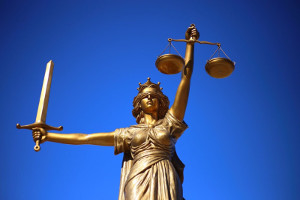
Natural law is sometimes referred to as God’s Law or Universal law. It’s a bit esoteric but really boils down to our innate sense of justice and fairness. It crosses cultures and all societies. We feel it as children, instinctively accepting it as the difference between right and wrong.
I imagine no one reading this thinks it is acceptable for anyone to harm someone else, unless it’s in self-defence. Of course, there are exceptions to this ‘universal’ acceptance of Natural Law. Some people are psychopaths. However, most of us understand this principle.
The Rule of Law, or Common Law, is the expression of Natural Law through judgements. The judgements are made by the people when they form a jury.
Under the Constitution, the British government, represented by the Head of State and the elected executive branch of Parliament, is a creation of the people. It exists only while it serves the people and its primary function is to uphold the peoples’ Rule of Law.
If it ceases to do so, through their contract with the Head of State (the Crown,) the people can dissolve it. Government—and Parliament—does what it is told. As do the MP’s and the civil servants who work within government. Government is subordinate to the people.
With the real Constitution everyone, including the Head of State, are genuinely equal under the law. This means the people are ‘equal in authority’ to the Head of State.
Many will immediately say this arrangement is unworkable and makes no sense. Fortunately, when the codified British Constitution was created, the mechanism which enables this process to work perfectly well was also set in perpetuity. It’s called Trial by Jury.
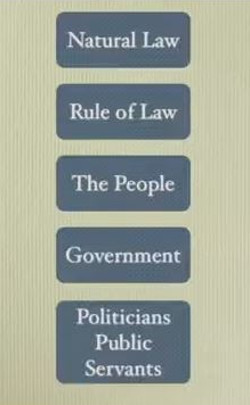
Under the British constitution anyone accused of any crime (breach of the Rule of Law or ‘legislation’) has the right to trial by a jury of their peers. Today this means 12 people will be selected to pass judgement upon the accused, following an examination of the evidence in the trial.
Under the real constitution, it is the jury who make the judgement, not the judge. In fact the term ‘judge’ is a deceptive change of language to hide the fact they are actually called ‘conveners’ under Common Law. Their role is essentially administrative.
Judges (convenors) have no authority to direct the jury how to find the defendant. They cannot interfere in any way in the jury’s judgment and they do not decide the punishment. The ‘convener’ can only advise the jury and then administrate the punishment meted out by the jury.
Under the constitution, whether the accused broke or did not break the law is not the jury’s primary concern. ‘Guilt’ is a question of Natural Law. They examine their own consciences to judge if the actions of the accused were fair or unfair, just or not.
Did the accused act with intent to cause harm, did they cause harm through unacceptable negligence, were their actions wrong? It is perfectly acceptable for a jury to acquit someone who has technically broken the law but has, in the jury’s judgment, acted for honourable or just reasons.
Under the codified Constitution the questions of guilt and punishment are solely the province of the peoples’ jury. Each juror’s decision is a private matter for them alone, and the defendant can only be found guilty through the unanimous verdict of all jurors.
If the jury accept the defendant has contravened ‘legislation’ or fallen foul of the law, but has acted in good faith, they can find them ‘Not Guilty.’ Clearly, if the accused is judged to have committed no harm, but the legislation says they have technically ‘broken the law,’ the problem is with the law, not the defendant. Regardless of the breach, the Jury can decide to annul the legislation. The Law has been found to be an ass.
‘Annulment by Jury’ starts the process or removing the unjust legislation from the statute books. This is the Rule of Law under the withheld British Constitution.
The implication of ‘Annulment by Jury’ turns the current power structure, claimed by Parliamentarians, on its head. It is the reason why the British people have been misled for centuries. Natural and Common Law, applied by the peoples’ jury, effectively overrules Statutory Law. In a very real and practical sense a jury can force an Act of Parliament to be repealed.
Even better, if legislation is passed which the people deem to be unfair, cruel or unjust they are empowered to prosecute the people who made that oppressive law by calling them to face a free trial by jury. Making draconian, unjust legislation a lawful impracticality. There would be no point in owning corrupt politicians because, if their legislation was deemed unjust by the people, it would be overruled and removed from statute.
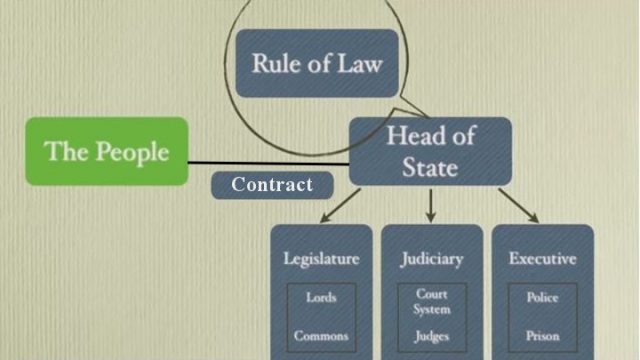
If the real British Constitution was observed, the people would determine the rules which govern society. Every single time the Law is tested, through Trial by Jury, the people would decide if the statutes, created by Parliament, were reasonable and fair. As Common Law supersedes Statute Law the politicians would effectively be instructed, by the people, either to amend their poor legislation, as required, or get rid of it.
This would transform, or rather create, real democracy. The meaningless choice we currently get between two or three corporate owned ‘political parties’ would cease. The people, through the Rule of Law, would run society. Not a bunch of corrupt, self-serving careerists.
Under the current system, whoever you vote for you get the government. A government which always serves the interests of its puppet masters rather than the peoples’. If we adopted the real British Constitution, the lobby industry would collapse. Throwing huge bungs at Politicians or blackmailing them over their sordid indiscretions would be useless. They simply won’t have the power to deliver, no matter how hard they are squeezed.
This would make the misuse of power very tricky for those who like doing that sort of thing. Illegal wars, state cover ups, corporate corruption, blackmailing of compromised officials, and so many other travesties we are forced to endure under the existing system, would become virtually impossible and largely irrelevant.
Does that sound like a better system to you? Do you think this would help to stop the endemic corruption, injustice and inequality we see every day in the UK? Would you like to see such a Constitution implemented?
Well the truth is, the British have had exactly that Constitution for more than 800 years. It’s just that it has been systematically ignored, obfuscated and buried by those who don’t want you to know anything about it. Because otherwise, they wouldn’t be able to operate their criminal cartel.
In Part 2 we’ll look at how this has been done and consider what we can do to assert the Rule of Law and bring an end to the tyranny we live under.

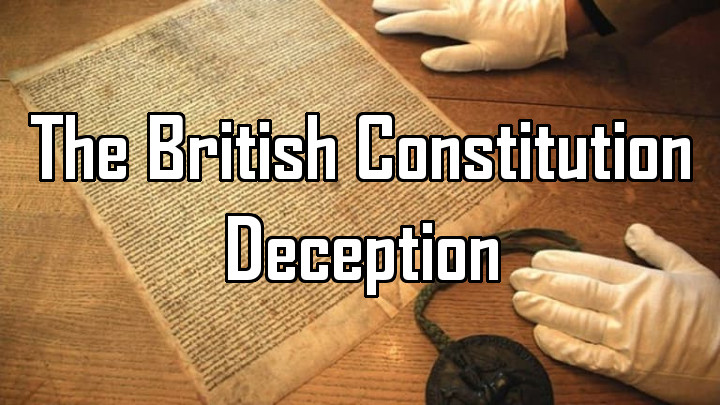

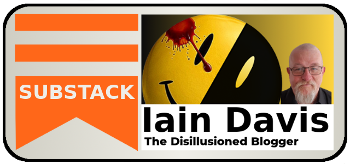

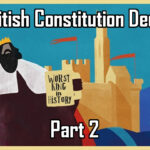



Wonderful, about time someone spelt it out. Thank you understood it a long time ago, now everyone i know will know from someone else. Bravo!. 🙂 Blessings
Strange isn’t it, how we can show people evidence but they’ll never believe us. Yet if someone they don’t know shows them the same evidence they are more inclined to accept it. This is a problem I feel. People generally seem unable to differentiate between evidence and opinion. The point being we all have opinions but they are better informed when they are based upon evidence. The evidence is the crucial element. Not the person or medium conveying it.
Brilliant. A great read.
Opinions mean nothing unless there is evidence to transform them into fact. Yet, opinions have enormous emotional capital, such is the sad state of our culture and its law.
It is indeed in a sad state. However, there is reason for hope. The constitution still exists and if more learn about it it can be used. It is currently being used by the Common Law Courts to block the extradition of Lyn Thyer. https://www.commonlawcourt.com/clc_cases/the-people-represented-by-john-smith-v-michael-alan-supperstone-the-honourable-mr-justice/
thanks for the kind comment and fingers crossed.
Its a very good article and about time the truth was posted about the deceptions of the state and rule of law.
I have been doing the same for about 10 years now myself and would like to share just a few things that I consider to be slightly wrong in your otherwise great article.
Firstly, stating that we have had a constitutional monarch since 1688 isn’t quite true…we have had the same since at least 1215 with the sealing of the Magna Carta, and possibly further back than that.
Also in part 2 the Great Charter of Liberties was created in 1100 ad….Magna Carta is also called the Great Charter but the two charters are not the same thing.
Finally the Declaration of rights didn’t destroy the divine right of Kings…Magna Carta did that in 1215.
I hope these points are of some use they are not meant to criticize an otherwise very good article.
Many thanks David. I appreciate the corrections. I’m sure you’re right. I will verify and update the post accordingly.
Thanks great aRticle where can I find out a bit more thanks
Hi John
The Common Law Courts: https://www.commonlawcourt.com/
The British Constitution Group: https://www.britishconstitutiongroup.com/
The New Chartist Movement: https://www.newchartistmovement.org.uk/
Also I highly recommend reading Ken d’Oudeney Democracy Defined: The Manifiesto https://www.britishconstitutiongroup.com/
Hi Iain. Thanks for helping to expose this hidden information. It is critical that the people of this country – even the world wake up to this. Greater and wider knowledge of how the constitution is REALLY supposed to work would destroy the deep state alliance. You articulated many of the points far better than I did 🙂
William Keyte
Thanks William. Without your work and others I wouldn’t have known any of this myself. I hope I did it some justice. Thanks for the kind comment.
Who is the CEO of UK Corporation Ltd, and what official authority granted the corporate status to the company?
Good question. Please let me know what you find out.
A most excellent article thank you Iain. I note above some sites that you recommend by wonder if you have spotted our own The Harrogate Agenda withits six demands?
http://harrogateagenda.org.uk/ and our Niall Warry does a very good 20 minute address: https://www.youtube.com/watch?v=nvJAmkSOuck&feature=youtu.be
Thanks Peter. I have now and have bookmarked for further review. Thanks.
You are heading in the right direction but I’m afraid the current inescapable fact is that since parliament took sovereignty from the monarch, in the mid 1600s, that is where ‘Power’ lies and of course one parliment can not bind its successors.
The Rule of Law and Common Law etc all have their place but by law it is our parliament that is sovereign.
We in The Harrogate Agenda agree that the inherent sovereignty of the people should be recognised in law and we have six demands in support of that aim and that also completely reform our system of government.
We believe in revolutionary reform brought in over an evolutionary time frame.
I strongly believe that until our demands are realised everything else is just so much wishful thinking.
Change can and will only come from ‘People’ pressure but the facts today are that the people are generally too comfortable and too busy getting on with their lives. Next year with the twin economic hits of Covid and a No Deal Brexit we must hope the people will start to wake up and will focus on how badly they are being governed and start to do something about it.
http://harrogateagenda.org.uk/Default.aspx
Thanks Niall. Peter has sent me the links to your site and I will look at it. Personally, I believe we already have a codified constitution and the claimed sovereignty of Parliament in a baseless deception. I am also opposed to the concept of government and authority. I do not believe any solutions can come from “government”. A voluntary society based upon Natural Law legum terrae with governance by trial by jury is the best way to restore the Rule of Law.
Thank you so much… you have encapsualated what I have always instinctivly felt about the problem with “Democracy”… the common-usage word is a smokescreen used by those who would lie to and manipulate others in order to create and maintain their power base, In short, Psychopaths.
I would love to discuss this paper further, a topic dear to my heart, but others are more perceptive and qualified than I could ever be; suffice it to say that my views began to form when I worked out my principle of “Golden-Rule Anarchy”, which I hope describes itself.
People should never forget that the original Athenians would meet with their Arkons under a tree in the town square, not just to shade them from the hot mediterranean sun, but also in order to hang the aforementioned should they incur the displeasure of the Demos.
It’s a pity that the past cannot be resurrected.
Thanks Kris. I agree with much of what you said, although I am strongly opposed to capital punishment. I would be very interested to know more about your proposed “Golden-Rule of Anarchy”. “Do unto others as you would have them do unto you” [Luke 6:31 and Matthew 7:12] underpins “cause no harm, cause no loss” but it presents some tricky moral conundrums, so I look forward to hearing your take on it.
Excellent piece, very interesting, and something to build on.
Just 1 small correction:
Neither the word “demos” nor the word “kratos” come from Latin but from Ancient Greek.
Many thanks Peter. I will correct that.
I wholeheartedly disagree with Niall Warry’s statement. The true inescapable fact is that, if Parliament is indeed “sovereign” (it is not), how was it ever lawfully established?
Was it when Parliament itself decided that Parliament itself was sovereign? If so, when was Parliament itself lawfully granted this authority to declare Parliament itself sovereign? Again, was it when Parliament itself granted Parliament itself the right?
Or, which man or woman (or men/women) in Parliament was/were ever lawfully granted this right and authority to vote for and declare such? The truth is they never were. They can have all the little votes with their little job titles all they like – in reality none of those votes have anything to do with you or I without the lawfully-established, legally binding evidence to back it up – or, of course, your explicit consent.
There is nothing “sovereign” about a fictitious entity over living men and women, from whom it was created.
I am sovereign. You are sovereign. If you disagree, please provide the lawfully-established legal agreement, document, contract or obligation which dictates that the sovereignty of individual men and women was lawfully outsourced to “Parliament”. You will not be able to do so, without the inclusion of (unlawful) dictatorship and/or (unlawful) slavery.
Parliament has never been, is not, and will never be “sovereign”, despite what the parasites known as politicians may say. WE are sovereign, although if you provide the evidence asked for above I will happily change my mind.
I’ll put the kettle on…
I agree Mike.
IMHO over reliance on Rule Systems is a severely flawed (naive) approach to management…
Walter Bagehot might be “enlightening” for novices… https://www.britannica.com/topic/The-English-Constitution